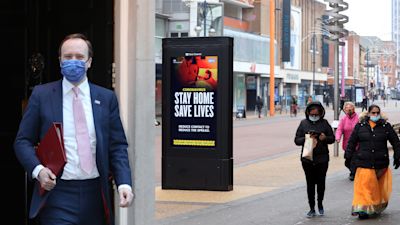Covid: Health secretary 'cannot answer' whether Coronavirus Act will continue beyond next six months

The health secretary has said he “cannot answer” whether the emergency laws to tackle the Covid pandemic will last beyond the next six months.
Opening the debate in the House of Commons on coronavirus regulations, Matt Hancock said: "I cannot answer whether we will be retiring it in six months. My preference would be yes, but given the last year, I think a prediction would be hasty."
Mr Hancock was addressing the Commons ahead of a vote on extending emergency powers in the government's Coronavirus Act and approving Boris Johnson's regulations for the route out of lockdown
The vote is likely to comfortably pass, with Labour not expected to oppose the measures, but the Covid Recovery Group of Tory lockdown sceptics look likely to rebel against their own party.
Mr Hancock added that the powers in the Coronavirus Act will only be retained "as long as they are necessary".
He told the Commons: "Although this Act remains essential and there are elements of it which we are seeking the renewal of, we’ve always said that we would only retain powers as long as they are necessary.
"They are exceptional powers and they are approved by this House for the use in the most extremis situations and must be seen in this light.
"And because of the progress we have made, we are now able to expire and suspend a whole raft of measures within this Act, just as we expired provisions after the last review six months ago."
Coronavirus: What you need to know
The Act has come under fierce criticism, however, with Conservative MPs lining up to attack it.
Sir Charles Walker told the Commons on Thursday: "As sure as eggs are eggs, we will be back here in six months at the end of September being asked to renew this legislation again. It is inevitable and anyone who thinks it’s not inevitable is deluding themselves."
Former minister Mark Harper, and chair of the Covid Recovery Group of Conservative backbench MPs, said the provisions in the Act should be expired "at the earliest possible opportunity".
Labour's Richard Burgon also said he will vote against the Act, urging the government to bring back better legislation.
"I will vote against this Act and the government should bring back a better Act, one that protects civil liberties and one that tackles both the public health and social crises," he said.
What powers does the Coronavirus Act give the government?
Infectious persons - Under the act authorities have the power to require a person by law to have a Covid-19 test and go into isolation if required.
International travel - The Act bans international travel "without a reasonable excuse". The government has outlined those exceptions, including what's become known as the "Stanley Johnson clause" which allows overseas travel in connection with foreign homes.
Gatherings - The legislation grants ministers the power to restrict events and gatherings, as we have seen with the limits on the number of people who can mix and where, as well as close venues.
On the roadmap out of lockdown, Mr Hancock said the government’s goal was "to be cautious yet irreversible".
It comes amid discussions of coronavirus vaccine passports as a way for society to start to get back to normal as restrictions ease.
'Certification could play a role' says PM on idea of vaccine passports:
On a post-lockdown future, Mr Hancock told MPs he hoped a regular vaccination programme, rather than restrictions, would combat Covid.
"We will eventually see Covid as something that has to be managed, rather like flu," he said.
"We don’t put in place restrictions on normal life to tackle flu but we do have a regular vaccination programme and that is where I hope, with vaccines, we’re able to get to."
The health secretary also said he thought face masks should become "a matter of personal responsibility in future".
Is the UK's vaccine rollout still on track? Find out in Calling Peston: